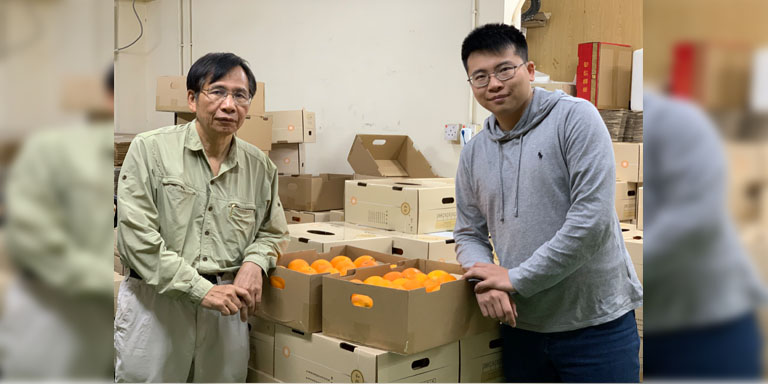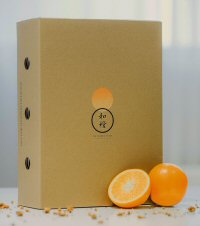
Self-made industrialist Li Tao-tak (at left, main picture) was born and raised in Hong Kong; he retired from the plastic mould business in 2011 and invested HK$200 million (US$26 million) to establish Zhanxiang Farm in the Hunan Province. Nine years on, the formerly barren hills have become colourful orchards forming a self-sufficient, circular ecosystem.The fruit farm in the mountains around Chenzhou contain 200,000 thriving orange trees. The mild southern climate, clean water and herbicide-free soil boost orange growth. Each orange tree's output has continuously increased over the years. Production in 2018 was 2,700 tonnes; by November 2019, output for the year reached 3,200 tonnes.Zhanxiang farm grows the “harmony” cultivar orange, symbolising the fusion of food and nature. Mr Li said this is not just a label but the core philosophy in the orchard’s operations.“The oranges I sell are not cheap. Especially in Mainland China, when the wholesale price of oranges from other fruit farmers is RMB2 (US$0.30) to RMB3.” His oranges cost almost twice as much. “When investing in fruit trees, you have to wait five to six years to see results,” Mr Li pointed out. The business would not generate big returns, he said, but he wanted to do it in the most natural way. “I want to create an ecological cycle system, with only the most natural fertilisers and soils. This produces the best-tasting oranges.”
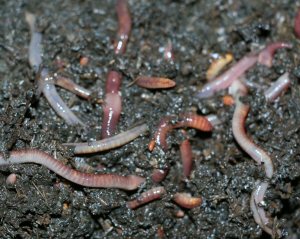
Ensuring soil quality starts right at the beginning, when planting grass in the fields that will hold the trees, Mr Li believes. The farm runs chickens, donkeys and pigs on the fields to supply manure. As the manure decomposes it heats up, killing the bacteria. Usually, poultry forage in the orchard, eating discarded fruits. The food is good for the poultry and the manure nourishes the trees.“Animal manure can be used to raise earthworms,” Mr Li said. “Earthworm manure is the most natural fertilizer used in mountainous areas and orchards.” Waste organic material is put into a fermentation system to create biogas. Slurry from the fermentation system then becomes fertiliser. Organic production pushes up costs but Mr Li said the farm insists on not using chemical herbicides. “We hope to preserve the original appearance of the land; withered grass and fallen tree branches compost on the land, enhancing the organic matter content of the soil.” This enhanced soil produces tasty oranges.“And most importantly, this ecosystem is not a dream,” he said. “It has been in operation for several years.” “Heritage” refers to more than just high-end technology, he said. It also comprises the fertility and health of the soil but also the inheritance of the earth's resources.
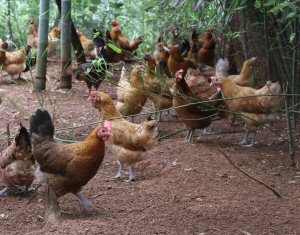
Li Hung-chung (at right, main picture), an economics graduate from a United States university, whose father opened up the barren farmland, has been working on promoting the business. The father and the son have moved away from the traditional concepts of promotion as social media has become the fastest and broadest way of delivery. Mr Li and his son believe the ancient method of communication, word of mouth, is now the most effective and practical. Li Hung-chung said: “My Father's first customers were his friends. They used to be friends from the industrial or business world. One year, he brought in 50 friends, including doctors, lawyers and wealthy businessmen. They ate the oranges and thought they were delicious, then passed on to their friends. One passed to 10 and these to 10 more, as a result, they bought 200,000 oranges.”They gave up selling through supermarkets and markets, choosing some local environment-focused food stores and online sales; another leading customer is a mainland wholesaler. The firm had to completely re-invent its marketing since the cost of each orange is so high. Knowledge became the touch-point. When customers know where oranges came from and how the fruit was grown, they believe the product is healthy.
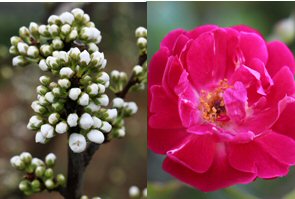
Mr Li and his son are very proud of the farm's ecological cultivation system and want more people know about Zhanxiang Farm.“If you want to touch the orange, it is better to come to the farm,” Mr Li said. “We want to develop eco-tourism.” He believes anyone who stays at the farm for three days and two nights can fully grasp the mystery of the “orange that has orange flavour”.Mr Li said moving into ecotourism had come about spontaneously, following comments from customers who came to the farm to sample the oranges. “In the past few years, friends who had eaten the oranges were curious about how our orchards work; tours started batch by batch,” Mr Li said. “People called and asked if they could visit the orchard. In this way, we have begun some short-term experience tours in recent years. Starting with picking oranges in the orchard, we went on to visiting the eight production bases in the orchards, then serving food on the site, looking at the biogas fermentation, and farming experience. Groups stayed at the farm. After hosting many groups, we had the idea of using existing resources to start an ecotourism business.To improve the farm's appearance, Mr Li opened up more plots to cultivate flowering crops – rapeseed, honeysuckle, pear blossom, and the latest is cherry blossoms. There will be blooms everywhere in the farm in the coming spring, he said. Mr Li provisionally set the price for tour groups at about RMB600 (US$86) per person per day, and three meals and one night are arranged by Zhanxiang. They can also arrange coaches so tourists can visit other places of interest in Hunan.
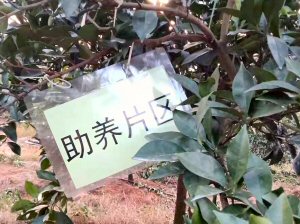
The farm has also launched an orange-tree subscription service, where a customer pays HK$1380 for a tree each year, and obtains all the fruit from that tree. Mr Li said: “In 2019, at least 168 oranges were delivered to customers’ homes. When the orange tree is harvested, we will deliver fruit in the same amount, maybe 200 or 300 oranges. The popularity is not surprising. A tourist who stayed at the farm for three days subscribed for 10 trees at once.”Earlier the farm hosted small, brief tours which let people know about the oranges; visitors ordered many oranges to take back. As soon as the news of the harvest time came out, Zhanxiang received four times more orders than it expected. The uptake surprised Mr Lee. When asked if he would be interested in participating in the annual HKTDC Food Expo organised by the HKTDC, so more people could taste the orange, Mr Li was very interested. His son pointed out that the fruit is kept in its natural state, not waxed or refrigerated. This made it difficult to serve distant markets. “But in the long run, we will also consider whether we can cooperate with HKTDC. We could expand the market to Malaysia and Singapore because people there are also willing to spend on healthy food.
Related link
My Farmer’s Story
